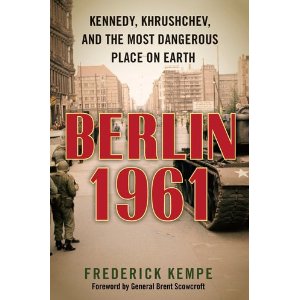The Book Club Online is the oldest book club on the Internet, begun in 1996, open to everyone. We offer cordial discussions of one book a month, 24/7 and enjoy the company of readers from all over the world. everyone is welcome to join in.
Berlin 1961 by Frederick Kempe
 |
JOIN US in September as we renew our history, a more accurate history, of events that most of us remember very well. Historians are now able to not only do research into fresh new documents, but personal interviews have uncovered a wealth of information that is stunning to read. A young, untested, wealthy, U.S. president meets a Russian premier, son of a coal miner; Kennedy and Khrushchev, opposite in every way, yet holding the world in their hands. It's drama at the very best.
President Kennedy called the year a "string of disasters;" Kempe called it one of the worst of any modern presidency.
The book is divided into three parts: THE PLAYERS, THE GATHERING STORM AND THE SHOWDOWN.
Fascinating history, dramatic with new research into documents never before explored. |
The Players
.jpg)
.jpg)
.jpg)
.jpg) Left to right: Krushchev - Ulbricht - Kennedy - Adenauer
Left to right: Krushchev - Ulbricht - Kennedy - Adenauer Discussion Schedule
Sept 1-8 Part I
Sept 9-16 Part II
Sept 17-30 Part III and Epilogue
Some Topics for Consideration
Sept 1-8 Part I
1. A few of our greatest presidents, e.g., Washington, Lincoln, FDR, found their place in history because of war. Is this a true statement? Is there a president, in your opinion, who has been a great one in time of peace?
2. Was Kennedy ill informed about the Soviet Union when running for President? Was he ill informed on foreign affairs after gaining the presidency? Who advises a new president on foreign affairs?
3. Why was it important for East Berlin to become an independent state? Why did Krushchev believe he had the power to influence the USA to accept the reality of two German states?
4. Both Eisenhower and Krushchev had a poor opinion of the new president; why?
5. If the Soviet Union should overrun Berlin, what were the options of the West?
6. If it came to a war, why did the author believe that the Soviet Union would win it?
7. President Kennedy was in very poor health. Why did he run for the office? How could we prevent a candidate from taking office who is in in poor health or should we be concerned?
8. In your opinion should the United States have flown a spy plane over Soviet territory ,(the Gary Powers incident)?
9. Kennedy stated in 1957 that the “age of Adenauer is over.” Age discrimination on his part? How did Adenauer hang on so long in power in West Berlin?
10. How did Adenauer’s beliefs and values differ from Ulbricht’s? How were they similar?
11. Adenauer learned the hard lesson of working with Krushchev from a meeting in 1955. What were the results of that meeting?
12. What was Ulbricht’s challenge to Krushchev and why was it taken seriously by the Communist leader?
13. How did China become involved with East Germany?
Related links: Frederick Kempe's home page;
New York Times Book Review;
------------------------------------------------------------------------------------------------------------------------------------
There was an interesting article in yesterday’s San Antonio Express telling of a September 13th ABC program commemorating the Fiftieth anniversary of the Kennedy Administration. It will be a 2 hour special with Diane Sawyer and Caroline Kennedy. Included also will be a 50 year old previously never aired recording of a TV interview with Jackie Kennedy made shortly after she left the Whitehouse after JFK’s death. This interview has never before been seen and heard. I think this interview may be of interest to us as we discuss Part 2 considering Jackie Kennedy’s role in the Vienna conference in June 1961 and also later events covered in our book. .



